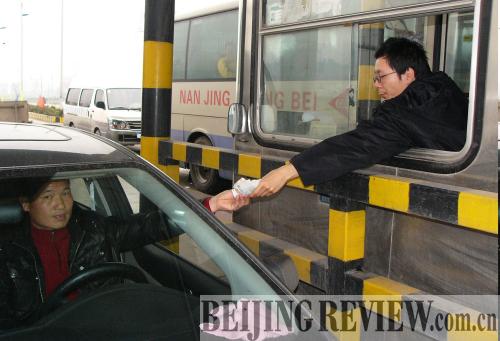|
 |
| STOP AND GO: Toll highways are the main part of China's road transportation network, but heavy and frequent toll charges are a major public concern (YANG HUA) |
Wellspring of Officials
The municipal government of Suining in southwest China's Sichuan Province said it was to select farmer-turned-workers for three official positions in grassroots governments.
It's encouraging to see migrant workers become officials. In a lot of places, selection and promotion of officials are a mystery to average people, with many officials determined even before an election.
Suining now has 1.09 million migrant workers who have moved to other areas. This is a quarter of its total population and 72 percent of its rural population. It is of no benefit for such a huge group to be a "silent majority."
The Suining Government's move has far-reaching significance. Selection of officials from among migrant workers will increase the awareness of participation in government affairs in a usually under-represented group.
While elites in different sectors are important to public affairs' administration, ordinary people who have extensive experience in dealing with real issues in China's market economy are needed as well.
Qianjiang Evening News
Profiting Brazenly From Flu
Recently, the Ministry of Health published several traditional Chinese herbal recipes for A/H1N1 flu, hoping cheaper treatment would help a greater number of people develop immunity. But some people have looked at this as an opportunity to make money.
In Xinmi County in central China's Henan Province a township hospital promoted a locally-developed traditional medicine treatment for residents. Students who refused to buy the medicine were even barred from entering school by education authorities.
Sales totaled 36,000 yuan ($5,300) in three days before the local government stopped the practice. Even the quality of the treatment was questionable—some of the herbs used were perished.
That Xinmi's education authorities required students to prove they had bought medicine from a designated hospital shows education and hospital authorities colluded—because they thought they had a chance to make big profits amid A/H1N1 flu hysteria.
Efforts are needed to prevent similar scandals in other places throughout China, so A/H1N1 flu prevention and control work can continue smoothly.
Beijing Times
Arbitrary Tolls Slow Traffic
The Shenmu-Pantang Highway connecting Shaanxi and Shanxi provinces is only 600 km. But it can take up to 12 hours to cover because of the number of toll booths. In fact, there are twice as many toll booths on that stretch of road as the state allows.
Highways are built to make transportation faster and more convenient, but some local authorities' arbitrary tolls end up causing exactly the opposite scenario.
Tolls were originally collected from drivers to cover road building and maintenance. But some local authorities continued to charge tolls even after they collected more than enough money to cover these costs.
And, on the Shenmu-Pantang Highway, one of China's main coal transportation routes, road management departments in both Shanxi and Shaanxi have set up toll booths.
Obviously, local authorities are not following state policies when they collect money to fatten their purses. The Central Government has taken measures to deal with the issues, but they have failed to resolve the problem.
The lure of lucre has prompted abuse of administrative power by some local authorities. It is a problem the Central Government should deal with immediately.
Zhujiang Evening News
Protecting Migrants
From the second half of 2008, a large number of migrant workers have been forced to return to their hometowns to take up agriculture again. This was brought about by job cuts in urban areas caused by the global economic slowdown.
But the latest statistics from the Ministry of Human Resources and Social Security show 94 percent of the workers have now returned to cities to work.
Despite this, some coastal cities are still facing labor shortages. Companies in these cities are now receiving more orders and need more workers in the short term.
But the practice of employing workers only when there are orders should no longer be the case. When export-oriented companies are not receiving orders, they fire migrant workers. These companies never give workers any sense of job security.
Besides that, many cities are still implementing discriminatory rules. For example, though migrant workers contribute enormously to local development, few of them are covered by these cities' social security programs because they do not have hukou (residence permits).
In some cities in economically developed Guangdong Province, migrant workers account for the majority of permanent local residents. But these cities are not providing equal treatment for them in health care and employment or for education of their children and in other fields. What these cities now lack are not migrant workers, but effective protection of workers' rights.
In order to establish a just society and promote sustainable development in urban areas, migrant workers' rights and interests must be respected and protected.
China Youth Daily | 